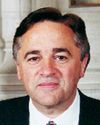Mr. Speaker, first of all, I would like to talk to the people of the riding of Mercier who gave me and the Bloc Quebecois such a huge majority and such a clear mandate to defend their interests and those of the whole province of Quebec in this House. I want to thank them for the confidence they have shown in me and I will try at all times to be worthy of their trust.
The riding of Mercier is located in the easternmost part of Montreal and it has suffered a great deal as a result of all the changes in the world economy. This riding is currently undergoing major changes and is in desperate need of a good employment policy, and that is what I want to talk about this afternoon.
I cannot help expressing the emotion I feel as I begin my first speech in this House, thinking about the forced union of 1840 when the patriots, companions of Louis-Joseph Papineau, ceased to be Canadians to become French Canadians just as the English became English Canadians.
The patriots who became French Canadians-and we know that Lafontaine was one of them and so was Laurier-had no other choice but to accept colonial government and to try to make alliances with members representing Upper Canada. And that is exactly what they did.
As a person with an active and abiding interest in history, I can testify that French Canadians have done everything to try to take their place in Canada. Individually they were successful, in some cases, although assimilation was sometimes the price they had to pay. As Quebecers they were not.
Mr. Speaker, let me explain, as others before me have done, why so many Quebecers see sovereignty as the only future for Quebec. I think the members of this House would find it worthwhile to listen to what I have to say and I think they should understand what is going on in a part of Canada's territory that has 25 per cent of its population.
The success of the Bloc Quebecois has made it abundantly clear that although placed in a minority positions, the Canadiens, later French Canadians and then Quebecers-in Quebec-were able to maintain their collective identity in the face of series of constitutional set-backs.
Today, members of the Bloc Quebecois form the Official Opposition because they represent a founding people that was never recognized as such. Members of the Bloc Quebecois can neither come to power nor govern Canada but they can testify to a truth that has long been denied and is nevertheless one that all Canadians must face: there are two countries in Canada. Quebec, like it or not, is that other country.
Mr. Speaker, it was not revenge for what happened in the past that led Quebecers, for the first time in their history, to elect as their representatives in the House of Commons a strong contingent of sovereignist members who campaigned as such. It was to prepare for the future in a Quebec with sufficient powers to use its resources to meet its own tremendous needs.
Today, standing before my peers and constituents, the people of Mercier and all of Canada, I want to start by discussing poverty and unemployment in Quebec. As I describe the extent of these conditions, I think you will understand why so many Quebecers became sovereignists in order to deal effectively and quickly with this catastrophe. This is an emergency, Mr. Speaker.
Quebec's pervasive unemployment, structurally higher than in Ontario, does not even give the whole picture of the devastating impact of federal policies. To really understand the difference between Ontario and Quebec, we should talk about the employment rate, the number of people in the labour force and the number of people who have jobs, and then we see the difference in wealth and development that separates the two so-called central provinces which have been indiscriminately attacked by the other Canadian provinces.
Mr. Speaker, high unemployment, a low job rate and an unusually high percentage of Canada's poor: that is the picture, and it shows us how economic conditions have affected social development. Without the economic picture, Quebec's participation in the federation might be seen only in terms of social expenditures. We must conclude that preventing economic development in Quebec has created a condition of apparent under-development which has had a profound impact on society itself.
And now for some history. You will recall that poverty levels in Quebec were measured and compared, probably for the first time, and in any case it was the first time they were compared with the rest of Canada, by the Boucher Commission. Some of you may remember this. In 1963, the commission concluded that Quebec, with, at the time, 28 per cent of the population of Canada, received a little over 36 per cent of the benefits paid in Canada under the new Unemployment Insurance Act.
This week, Mr. Speaker, the Montreal Island School Board published a report containing figures that are absolutely devastating for Quebec. I read the whole report last night.
For the first time since Statistics Canada has been gathering data, Quebec has the dubious privilege of being the poorest in Canada. Quebec has the largest number and the largest proportion of families living below the poverty line. In fact, the situation is worse than Newfoundland and New Brunswick which used to compete for this dreadful ranking. There is, in Quebec, a little over 25 per cent of the Canadian population, but almost a third of low income families.
The data from the 1991 census show that the Montreal area, among 25 areas considered, has the largest proportion of low income families. I might add that when we talk about the Montreal area, we include not only the island, but also the surrounding suburbs which have been remarkably richer for a long time. This gives you an idea of the standard of living in the city of Montreal and especially in some or its neighbourhoods. The situation is untenable. We can conclude that the years of the quiet revolution, which we are so proud of, although they did produce development, did not alter the distribution of wealth between Quebec and the rest of Canada. Poverty and relative under-development have a great deal of impact on social development.
The Minister of Human Resources will understand the social significance of the Canadian Assistance Plan, which pays 50 per cent of all welfare payments, and other cost-sharing programs of which Canada is so proud. We should add that this program has also contributed to maintain poverty rather than reduce it. Generally speaking it has increased Quebec's dependency on the rest of Canada and the dependency of individuals on society.
The Boucher report highlighted three main reasons why Quebec is poorer: its economic development, its share of the GDP, a poor state of health and mentalities in general. In its conclusion, it called mainly for what we would describe today as a full employment policy. To recognize as fundamental the right
to last recourse assistance could, in no way, contribute to the fight against unacceptable poverty levels.
It remains true; last recourse assistance can only be that. Having stated this truism, I feel compelled to state that the Canada Assistance Plan is partly to be blamed for this dependency. For example, because of the CAP, in the 1980's, Quebec was unable to claim 50 per cent of the assistance it wanted to give low income workers to help them stay in the work force. Under this plan, assistance could not be given to people who did not pass the needs test. In other words, Canada only supports helping the poor as long as they do not try to escape the poverty cycle, lose hope and give up their minimum wage job, and make the smart decision, moneywise, to go on welfare.
The way the federal government has managed unemployment insurance has led to the misuse of social programs, with the blessing of the federal government, since the 1970's; it has set up and financed short-term employment programs with no other way out than unemployment insurance. Lise Poulin-Simon and Diane Bellemare, two writers well known in Quebec for their work on full employment, stated in their first book entitled Le plein emploi, pourquoi? that neither government has any interest financially in investing in job creation since the other level stands to reap more benefits from the spin-off. Quite an important finding!
Beyond the totally negative impact of federal policies on the Quebec economy, redistribution policies have had perverse effects which, far from rectifying disparities, have had a tendency to maintain them and to keep people in a state of dependency and poverty.
I hope the House now has a better understanding of why Quebec has always wanted to repatriate all powers in the area of income security, including management of the unemployment insurance program. Using accountability as an excuse, the federal government has always insisted on keeping complete control over the funds it received and redistributed for social programs; in doing so, it maintained and even increased the gaps instead of decreasing them.
As critic for human resources, as a human being interested in the fate of ordinary people and the poor, wherever they are, I will not fight only against poverty and unemployment in Quebec. To be effective, though, we must first determine how to proceed. The fight against unemployment and poverty is a matter of collective will. Whether we like it or not, we must rely on the authorities in place and count on community participation. The solutions recommended for Quebec will not necessarily be valid for the rest of Canada, but already some broad lines are emerging.
In a recent proposal the Economic Recovery Commission of Newfoundland said, and the premier of that province concurred, that the unemployment insurance program and the various social programs should be managed jointly. In spite of the interest on the part of the Minister for Human Resources Development, I am not sure this reform will be possible without modifying the Constitution and renegotiating the plan in depth.
Even now we can imagine that the Newfoundland proposal would require a joint management headed by regional authorities who would take into account the specifics of each area. Premier Clyde Wells, the gravedigger of the Meech Lake Accord, could find himself asking for more than what he thought then could not be given to Quebec.
A secondary issue, which is nevertheless at the heart of the debate on social policies, concerns the accountability of the federal government for the amounts redistributed under their spending power. I take this occasion to mention that Premier Jean Lesage's negotiation for tax point repatriation in 1964 ultimately led to the establishment of the famous national standards, which caused the aberrations mentioned earlier.
In fact, if the federal government cannot redistribute the wealth without monitoring the application of national standards, it appears that Canada will be forced to choose between two equally serious evils, namely inefficiency which would be costly in economic, fiscal and social terms, or a basic inequality between regions and people in Canada. All the rest is simply talk.
Let us take, for instance, what we call the full employment policy in Quebec, and which could be called a labour-market active policy, a policy supported and promoted by many groups in Quebec and by the Parti Quebecois. Such a policy could not be applied in Quebec within the Canadian framework because the inherent overlapping, duplication and the consequent incapacity to take the right decision at the right moment are an obstacle to the maximization of social and economic efforts focused on employment. Could the other provinces that accept centralization hope for a Canadian policy of full employment that would be efficient? Of course, that is our hope.
It must be said that the prosperity enjoyed by Ontario and, at times, by Alberta, on which the Canadian redistribution system is based, is due only to the fact that all government policies converged to create this industrial complex and the many jobs associated with it that make Ontario by far the richest province, in spite of the tough recession it went through.
For cultural and linguistic reasons, this Canadian strategy does not work in Quebec. These last few years, Quebec has based its development on the creation of many consultation mechanisms. Unions, businesses, regional organizations and
governments have learned to consult with each other. These mechanisms, however, have not yet yielded their full results, far from it, because they are deprived of the decision-making powers which are in Ottawa, whose policies even sometimes work at cross-purposes.
Remember the sad story of occupational training? Many people in Quebec are becoming sick and tired of waiting for projects to materialize, of the waste of time and effort caused by duplication, the incredibly slow decision-making process and this federal-provincial morass that stifles every initiative. Quebec has one project that must be implemented soon.
As the Premier of Quebec said only yesterday, it is absolutely essential for the federal government to transfer quickly to Quebec responsibility for manpower development, including responsibility for unemployment insurance.
The Bloc intends to put up a strong defence of social programs, but bearing in mind that if there are no jobs at the end of the tunnel, all these people who want to stand on their own two feet at last will never be able to do so. We believe our social programs can be improved, but when the Department of Finance discusses social programs in terms of what can be cut and how to reduce the deficit, improvement is hardly the word.
Let us get this straight: if we want to get rid of the disincentive aspect of certain programs without exposing people in need to greater insecurity, we are not saving money, but increasing costs, at least temporarily. When we want to help people get training and create their own jobs and become employable, we have to invest the required money. If we want them to be productive during the time they are unemployed, we have to invest in counselling and training and financial support. And above all, if we want to boost employment, our regulatory framework and our monetary, economic and trade and regulatory policies should be such that they do not undermine the process.
The Minister of Human Resources Development will also have to take a clear stand. Either the reforms he has in mind are aimed at reducing costs, as the Department of Finance says quite firmly in its document, or he really wants to help the unemployed find jobs, and in that case, he will not be able to save money on social programs.
There is a dramatic gap, emphasized by a harsh recession, between those who want to cut social programs and, being rich, have never experienced insecurity or lacked money, and those who want to improve the effectiveness of these programs and who may, at any time, be obliged to use them for a certain period of time. The first group only thinks about the deficit. The second group considers the need to survive in a country going through tremendous economic changes, where there are no guarantees that the loss of many lucrative jobs would be compensated by promises of fantastic jobs in various technology sectors.
Canada must decide whether it wants to be like countries in Western Europe or like the United States, where wealthy neighbourhoods are surrounded by high walls and protected by armed guards, or like European countries where capitalism has realized it is in its interests to have an effective security net.
Mr. Speaker, you can tell the Minister of Human Resources and Development that he can count on my unqualified support whenever he wants to help people in need, but I will make every effort to be as fierce a parliamentarian as he was in the Opposition, whenever he deviates from this path. The people of the riding of Mercier, Quebecers and Canadians can count on my support in this respect.
Our party will vote against the sub-amendment moved by the hon. member for Calgary South West, because we cannot accept conditional limits on government spending, and in any case these spending proposals would first have to be submitted for scrutiny by a parliamentary committee.













































































